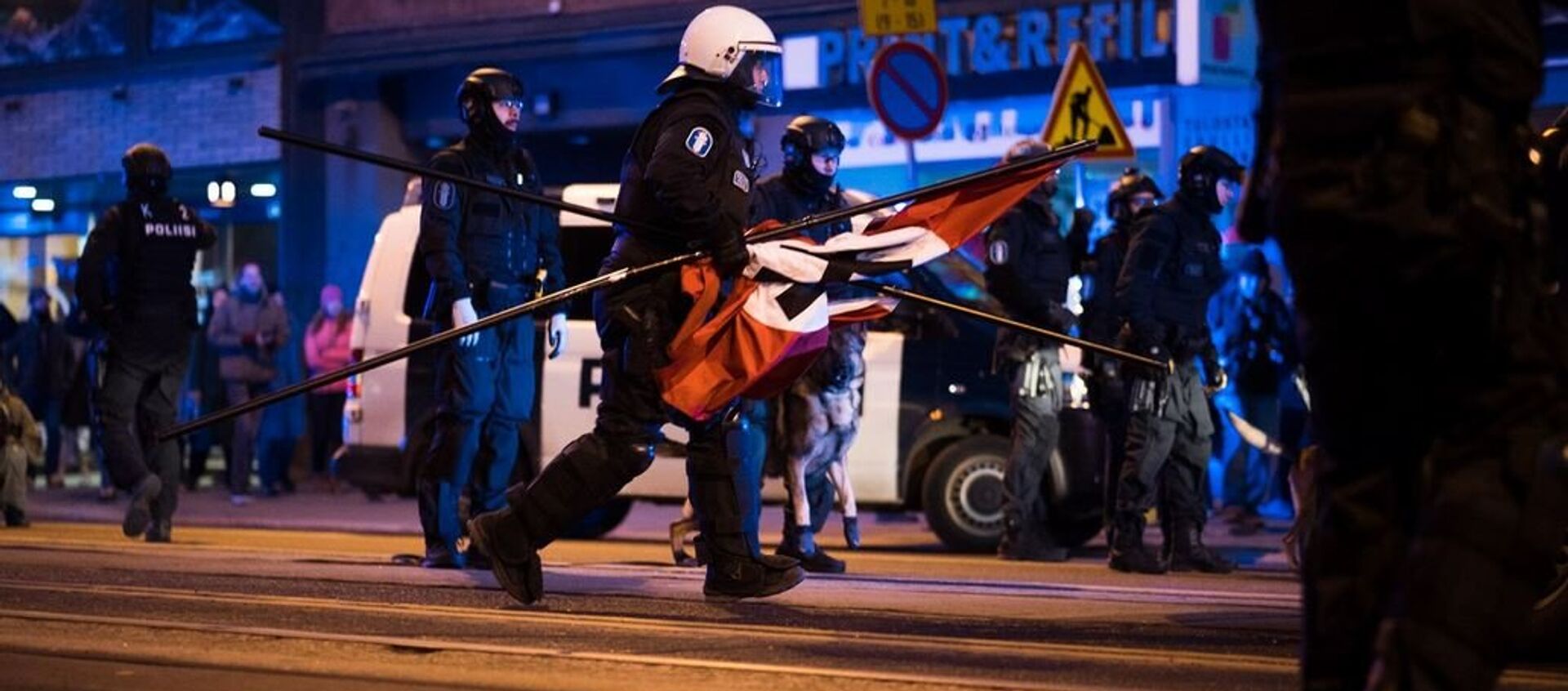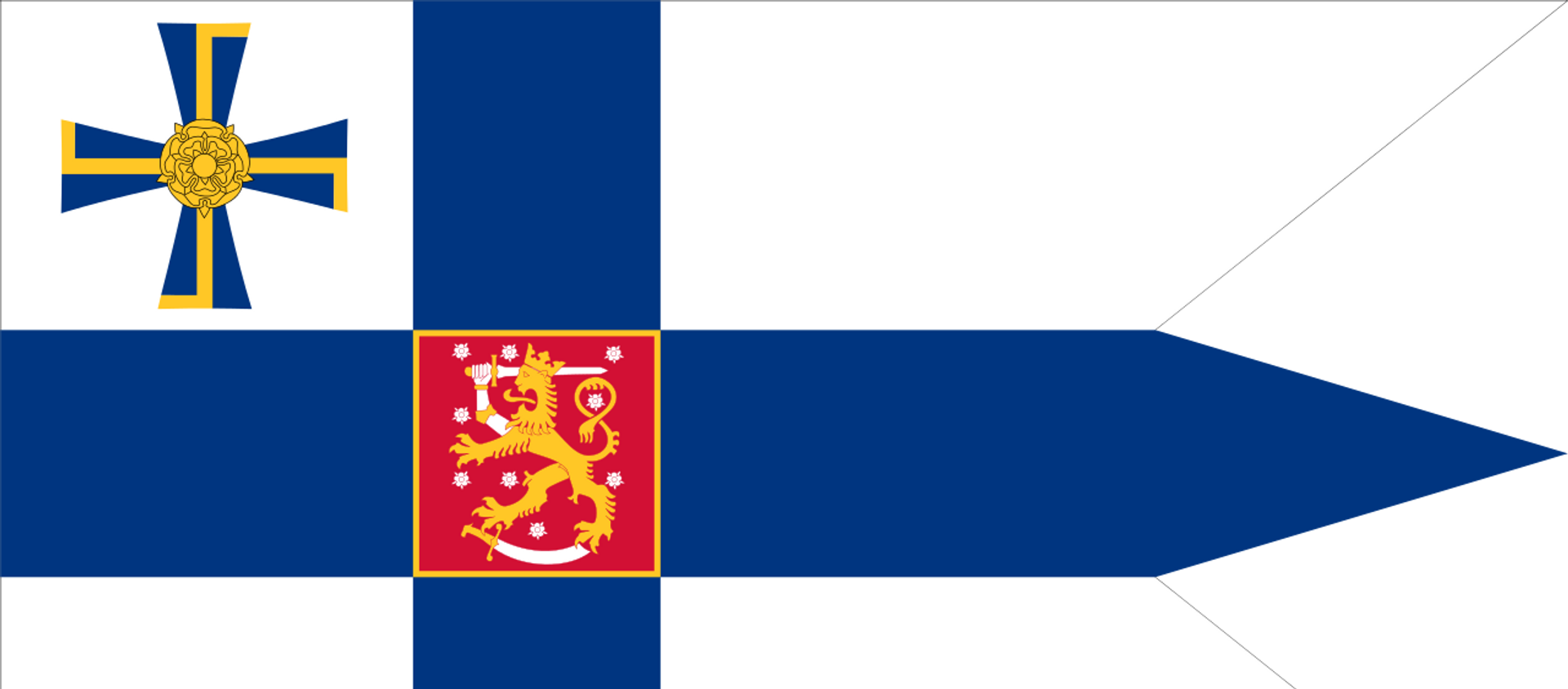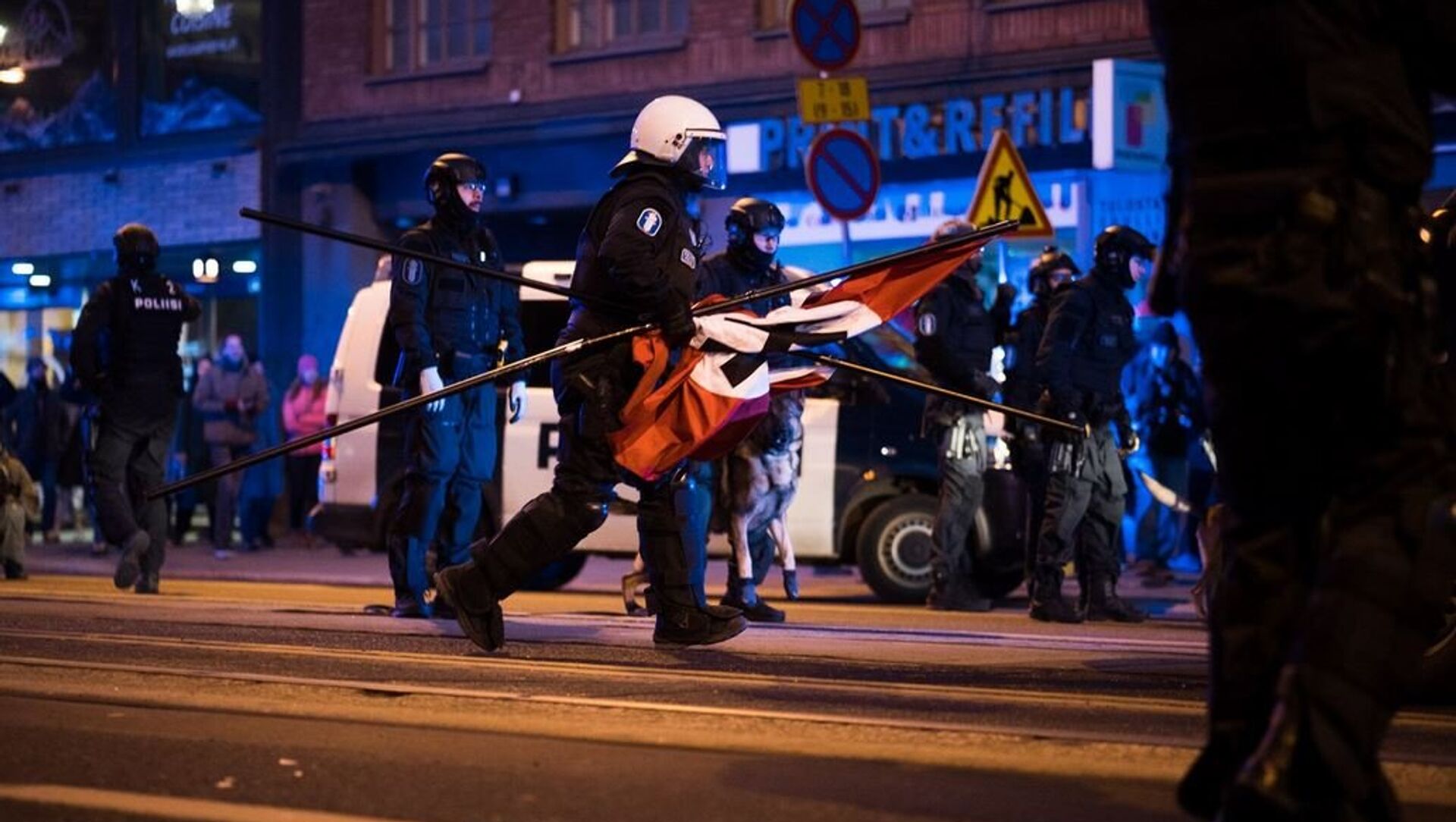https://sputnikglobe.com/20210902/majority-of-finnish-parties-support-swastika-ban-nationalists-disagree-citing-freedom-of-speech-1083774265.html
Majority of Finnish Parties Support Swastika Ban, Nationalists Disagree Citing Freedom of Speech
Majority of Finnish Parties Support Swastika Ban, Nationalists Disagree Citing Freedom of Speech
Sputnik International
The survey was largely spurred on by a Helsinki District Court ruling that unexpectedly dismissed criminal charges for displaying swastika flags on... 02.09.2021, Sputnik International
2021-09-02T05:41+0000
2021-09-02T05:41+0000
2021-09-02T05:41+0000
europe
world
newsfeed
finland
scandinavia
swastika
hate speech
freedom of choice
https://cdn1.img.sputnikglobe.com/img/107054/54/1070545416_0:50:1032:633_1920x0_80_0_0_b4e217761662b86cab82d3870c2800f8.jpg
In a major survey by national broadcaster Yle, the overwhelming majority of Finnish parties from across the political spectrum said they were prepared to criminalise public display of the swastika.Prior to the survey, the Helsinki District Court somewhat sensationally dismissed criminal charges against five men suspected of incitement against an ethnic group by displaying swastika flags on Independence Day.The ruling Social Democrats' parliamentary group chairman Antti Lindtman said the use of a swastika flag or any other symbol that violates human dignity should not be allowed in Finland. According to Lindtman, the association with the ideology and atrocities of Nazi Germany cannot be ignored.Yet, Lindtman emphasised that his party is awaiting the outcome of the ongoing legal process regarding the use of the swastika flag, as state prosecutor Raija Toiviainen has indicated she plans to appeal the district court's decision in the case."If it turns out that the legislation is deficient in this respect, we are ready to make the necessary changes", Lindtman said, musing whether it is appropriate to prohibit other symbols that degrade human dignity.Emma Kari, chair of the Green Party's parliamentary group, ventured that the public use of the swastika flag should be prohibited by law."Legislation must protect against racism and discrimination. If the current legislation fails to do so, then it must be rectified", Kari said, admitting that the ban would incur issues over how and when the flag should be displayed, such as in museums for educational reasons.Jussi Saramo of the Left Alliance said it was "quite evident" that the "public waving" of swastika flags should be banned in Finland, as has been done in other countries.Similar sentiments were expressed by members of the opposition. According to Kai Mykkänen, chairman of the National Coalition Party's (NCP) parliamentary group, the use of the swastika as incitement against an ethnic group or as a threatening gesture must be criminalised. Mykkänen raised the question as to what other symbols may end up on the exclusion list.The Christian Democrats said they would also support the swastika ban, as the party is very concerned about anti-Semitism, parliamentary group chair Päivi Räsänen underscored.The Centre Party said it doesn't want to take a stance until the appeals process is finished, but highlighted that the use of swastikas should be restricted by law.By contrast, the nationalist Finns Party said it was unnecessary to use legislation to ban the use of swastika flags.Its parliamentary group chair Ville Tavio cited the ultima ratio principle of criminal law, which says that a problem should only be criminalised as a last resort."In my opinion, this is not such a serious social problem that it requires the strongest possible intervention of the state", Tavio said, adding that he is more concerned about the growing restrictions on individual freedoms than about the use of the swastika flag in Finnish society.MP Ano Turtiainen, who recently founded the Power Belongs to the People Party (VKK) after being ejected from the Finns Party, rejected the idea of banning the swastika outright, arguing that restrictions on people's freedoms could spread further.Finland's history with the swastika actually predates the rise of Nazi Germany. From the late 19th century onwards, the swastika emerged as a symbol of rising Finnish nationalism. Following Finland's independence, the swastika was frequently used in the newborn nation's flags, emblems, and decorations, as well as house design. While the swastika somewhat fell into disuse following WWII, in which Finland was a co-belligerent of the Axis powers, it remains visible in historic contexts.
https://sputnikglobe.com/20210831/finnish-court-raises-eyebrows-as-it-drops-incitement-charges-against-swastika-display-1083756484.html
https://sputnikglobe.com/20171012/finland-swastika-controversy-1058168311.html
finland
scandinavia
Sputnik International
feedback@sputniknews.com
+74956456601
MIA „Rossiya Segodnya“
2021
News
en_EN
Sputnik International
feedback@sputniknews.com
+74956456601
MIA „Rossiya Segodnya“
Sputnik International
feedback@sputniknews.com
+74956456601
MIA „Rossiya Segodnya“
europe, newsfeed, finland, scandinavia, swastika, hate speech, freedom of choice
europe, newsfeed, finland, scandinavia, swastika, hate speech, freedom of choice
Majority of Finnish Parties Support Swastika Ban, Nationalists Disagree Citing Freedom of Speech
The survey was largely spurred on by a Helsinki District Court ruling that unexpectedly dismissed criminal charges for displaying swastika flags on Independence Day and launched a public debate on the appropriateness of this symbol, given Finland's long and complicated history with the swastika.
In a major survey by national broadcaster Yle, the overwhelming majority of Finnish parties from across the political spectrum
said they were prepared to criminalise public display of the swastika.
Prior to the survey, the Helsinki District Court somewhat sensationally dismissed criminal charges against five men suspected of incitement against an ethnic group by displaying swastika flags on Independence Day.
The ruling Social Democrats' parliamentary group chairman Antti Lindtman said the use of a swastika flag or any other symbol that violates human dignity should not be allowed in Finland. According to Lindtman, the association with the ideology and atrocities of Nazi Germany cannot be ignored.
"The genocide of the Jewish people is one of the most horrific crimes in human history. That history should not be forgotten or hidden, so its public glorification is highly questionable. It must be possible to restrict the public dissemination and presentation of Nazi ideology", he said.

31 August 2021, 05:20 GMT
Yet, Lindtman emphasised that his party is awaiting the outcome of the ongoing legal process regarding the use of the swastika flag, as state prosecutor Raija Toiviainen has indicated she plans to appeal the district court's decision in the case.
"If it turns out that the legislation is deficient in this respect, we are ready to make the necessary changes", Lindtman said, musing whether it is appropriate to prohibit other symbols that degrade human dignity.
Emma Kari, chair of the Green Party's parliamentary group, ventured that the public use of the swastika flag should be prohibited by law.
"Legislation must protect against racism and discrimination. If the current legislation fails to do so, then it must be rectified", Kari said, admitting that the ban would incur issues over how and when the flag should be displayed, such as in museums for educational reasons.
Jussi Saramo of the Left Alliance said it was "quite evident" that the "public waving" of swastika flags should be banned in Finland, as has been done in other countries.
"The reason why that flag is banned elsewhere and why it should be banned in Finland as well is that it represents pure evil. It is sad that our society has declined in such a way that this needs to be discussed at all", Saramo said.
Similar sentiments were expressed by members of the opposition. According to Kai Mykkänen, chairman of the National Coalition Party's (NCP) parliamentary group, the use of the swastika as incitement against an ethnic group or as a threatening gesture must be criminalised. Mykkänen raised the question as to what other symbols may end up on the exclusion list.
The Christian Democrats said they would also support the swastika ban, as the party is very concerned about anti-Semitism, parliamentary group chair Päivi Räsänen underscored.
"The scenes of swastika flags on the streets are a disgusting phenomenon. Anti-Semitism must be combated by remembering the events that led to the Holocaust. However, we also emphasise the need for extensive work against anti-Semitism, prohibiting use of the flag alone is not enough", Räsänen said.
The Centre Party said it doesn't want to take a stance until the appeals process is finished, but highlighted that the use of swastikas should be restricted by law.
By contrast, the nationalist Finns Party said it was unnecessary to use legislation to ban the use of swastika flags.

12 October 2017, 11:52 GMT
Its parliamentary group chair Ville Tavio cited the ultima ratio principle of criminal law, which says that a problem should only be criminalised as a last resort.
"In my opinion, this is not such a serious social problem that it requires the strongest possible intervention of the state", Tavio said, adding that he is more concerned about the growing restrictions on individual freedoms than about the use of the swastika flag in Finnish society.
MP Ano Turtiainen, who recently founded the Power Belongs to the People Party (VKK) after being ejected from the Finns Party, rejected the idea of banning the swastika outright, arguing that restrictions on people's freedoms could spread further.
Finland's history with the swastika actually predates the rise of Nazi Germany. From the late 19th century onwards, the swastika emerged as a symbol of rising Finnish nationalism. Following Finland's independence, the swastika was
frequently used in the newborn nation's flags, emblems, and decorations, as well as house design. While the swastika somewhat fell into disuse following WWII, in which Finland was a co-belligerent of the Axis powers, it remains visible in historic contexts.




